A referendum to expropriate the property of the former ruling houses was held in Germany on 20 June 1926. [1] Although a majority of those who voted voted in favour, the voter turnout of 39% was too low for the proposal to pass into law. [2] [3]
A referendum to expropriate the property of the former ruling houses was held in Germany on 20 June 1926. [1] Although a majority of those who voted voted in favour, the voter turnout of 39% was too low for the proposal to pass into law. [2] [3]
The violent revolution of November 1918 had not settled the question of what to do with the property of Germany's now former ruling houses. Policy was left up to individual states, many of which made settlements involving some sort of seizure of property. [4] The issue was settled indirectly on a federal level when the Weimar Constitution came into effect in August 1919. Article 153 stated that property could only be expropriated for public welfare and with appropriate compensation. [4] The article was designed to protect property rights in general and was not directly aimed at solving the issue of princely expropriation. Nevertheless, it made the princes safe from the threat of losing their property without being compensated. In addition to this the courts of Germany had largely remained unchanged since the Imperial era and so usually sided with the princes when expropriation cases came up. [4]
The Communist and Socialist parties believed in expropriating the former ruling houses without giving compensation. Attempts to make this happen through the Reichstag always failed due to the opposition of the other parties. [5] The liberal DDP and DVP, the Catholic Centre Party and the nationalist DNVP all saw such attempts as extremist attacks on property rights. [6] The DVP and the DNVP also opposed these attempts due to their monarchist leanings (although both parties had relegated a restoration to a long-term goal by this stage, effectively recognising the republic). [6] The Communists and the Socialists hoped that the public would be more sympathetic. By 1926 over 30,000 signatures expressing support for expropriation without compensation were gathered. This forced a referendum on the issue, under Article 73 of the Weimar Constitution. [7]
On 15 March, President Hindenburg added a hurdle to the success of the referendum. On that day, he informed Justice Minister Wilhelm Marx that the intended expropriations did not serve the public interest but represented nothing more than fraudulent conversion of assets for political reasons. This was not permitted by the Constitution. On 24 April 1926, the Luther government expressly confirmed the President's legal opinion. For this reason, a simple majority was not sufficient for the success of the referendum, and it needed support from 50 percent of those eligible to vote, about 20 million voters. It was not expected that these numbers would be achieved.[ citation needed ]
The referendum was held on 20 June 1926. [8] A large majority of those who voted voted in favour of expropriation without compensation. However, the Constitution required that a majority of all eligible voters had to vote in favour of a referendum proposal for it to become law. This did not happen due to low voter turnout. [8]
| Choice | Votes | % | |
|---|---|---|---|
| For | 14,447,891 | 96.11 | |
| Against | 585,027 | 3.89 | |
| Total | 15,032,918 | 100.00 | |
| Valid votes | 15,032,918 | 96.41 | |
| Invalid/blank votes | 559,590 | 3.59 | |
| Total votes | 15,592,508 | 100.00 | |
| Registered voters/turnout | 39,707,919 | 39.27 | |
| Source: Nohlen & Stöver | |||

The German People's Party was a conservative-liberal political party during the Weimar Republic that was the successor to the National Liberal Party of the German Empire. Along with the left-liberal German Democratic Party (DDP), it represented political liberalism in Germany between 1918 and 1933.

The German National People's Party was a national-conservative and monarchist political party in Germany during the Weimar Republic. Before the rise of the Nazi Party, it was the major nationalist party in Weimar Germany. It was an alliance of conservative, nationalist, monarchist, völkisch, and antisemitic elements supported by the Pan-German League. Ideologically, the party was described as subscribing to authoritarian conservatism, German nationalism, monarchism, and from 1931 onwards also to corporatism in economic policy. It held anti-communist, anti-Catholic, and antisemitic views. On the left–right political spectrum, it belonged on the right-wing, and is classified as far-right in its early years and then again from the late 1920s when it moved back rightward.
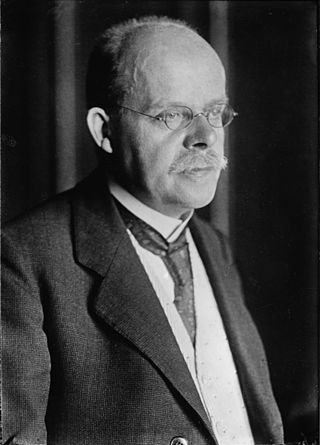
Wilhelm Marx was a German judge, politician and member of the Catholic Centre Party. During the Weimar Republic he was the chancellor of Germany twice, from 1923–1925 and 1926–1928, and served briefly as the minister president of Prussia in 1925. With a total of 3 years and 73 days, he was the longest-serving chancellor during the Weimar Republic.
In the fourteen years the Weimar Republic was in existence, some forty parties were represented in the Reichstag. This fragmentation of political power was in part due to the use of a peculiar proportional representation electoral system that encouraged regional or small special interest parties and in part due to the many challenges facing the nascent German democracy in this period.

Presidential elections were held in Germany on 29 March 1925, with a runoff on 26 April. They were the first direct elections to the office of President of the Reich, Germany's head of state during the 1919–33 Weimar Republic. The first President, Friedrich Ebert, who had died on 28 February 1925, had been elected indirectly, by the National Assembly, but the Weimar Constitution required that his successor be elected by the "whole German people". Paul von Hindenburg was elected as the second president of Germany in the second round of voting.
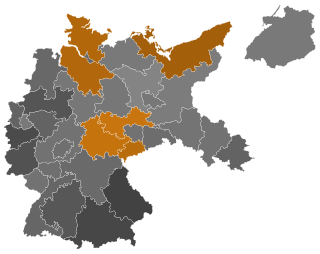
Presidential elections were held in Germany on 13 March 1932, with a runoff on 10 April. Independent incumbent Paul von Hindenburg won a second seven-year term against Adolf Hitler of the Nazi Party (NSDAP). Communist Party (KPD) leader Ernst Thälmann also ran and received more than ten percent of the vote in the runoff. Theodor Duesterberg, the deputy leader of the World War I veterans' organization Der Stahlhelm, ran in the first round but dropped out of the runoff. This was the second and final direct election to the office of President of the Reich, Germany's head of state under the Weimar Republic.

Federal elections were held in Germany on 14 September 1930. Despite losing ten seats, the Social Democratic Party of Germany (SPD) remained the largest party in the Reichstag, winning 143 of the 577 seats, while the Nazi Party (NSDAP) dramatically increased its number of seats from 12 to 107. The Communists also increased their parliamentary representation, gaining 23 seats and becoming the third-largest party in the Reichstag.
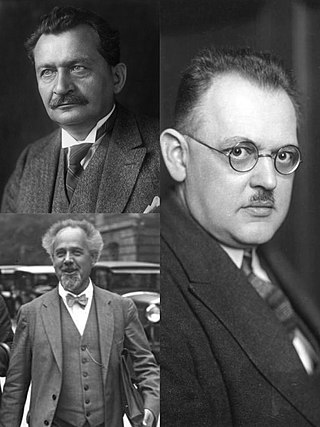
Federal elections were held in Germany on 20 May 1928. The Social Democratic Party of Germany (SPD) remained the largest party in the Reichstag after winning 153 of the 491 seats. Voter turnout was 75.6%.

The Free State of Prussia was one of the constituent states of Germany from 1918 to 1947. The successor to the Kingdom of Prussia after the defeat of the German Empire in World War I, it continued to be the dominant state in Germany during the Weimar Republic, as it had been during the empire, even though most of Germany's post-war territorial losses in Europe had come from its lands. It was home to the federal capital Berlin and had 62% of Germany's territory and 61% of its population. Prussia changed from the authoritarian state it had been in the past and became a parliamentary democracy under its 1920 constitution. During the Weimar period it was governed almost entirely by pro-democratic parties and proved more politically stable than the Republic itself. With only brief interruptions, the Social Democratic Party (SPD) provided the Minister President. Its Ministers of the Interior, also from the SPD, pushed republican reform of the administration and police, with the result that Prussia was considered a bulwark of democracy within the Weimar Republic.

The Weimar National Assembly, officially the German National Constitutional Assembly, was the popularly elected constitutional convention and de facto parliament of Germany from 6 February 1919 to 21 May 1920. As part of its duties as the interim government, it debated and reluctantly approved the Treaty of Versailles that codified the peace terms between Germany and the victorious Allies of World War I. The Assembly drew up and approved the Weimar Constitution that was in force from 1919 to 1933. With its work completed, the National Assembly was dissolved on 21 May 1920. Following the election of 6 June 1920, the new Reichstag met for the first time on 24 June 1920, taking the place of the Assembly.

The Reichstag of the Weimar Republic (1919–1933) was the lower house of Germany's parliament; the upper house was the Reichsrat, which represented the states. The Reichstag convened for the first time on 24 June 1920, taking over from the Weimar National Assembly, which had served as an interim parliament following the collapse of the German Empire in November 1918.

The Expropriation of the Princes was the proposed seizure of the dynastic properties of the former ruling houses of the German Empire during the period of the Weimar Republic. The princes had been deposed in the German Revolution of 1918–19. Dispute over the proposed expropriation began in the months of revolution and continued in the following years in the form of negotiations or litigation between individual royal houses and the states (Länder) of the German Reich. The climactic points of the conflict were a successful petition for a referendum in the first half of 1926, followed by the actual referendum for expropriation without compensation, which failed.
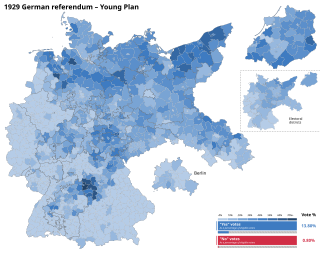
The 1929 German Referendum was an attempt during the Weimar Republic to use popular legislation to annul the agreement in the Young Plan between the German government and the World War I opponents of the German Reich regarding the amount and conditions of reparations payments. The referendum was the result of the initiative "Against the Enslavement of the German People " launched in 1929 by right-wing parties and organizations. It called for an overall revision of the Treaty of Versailles and stipulated that government officials who accepted new reparation obligations would be committing treason.

The Reichstag, officially the Greater German Reichstag after 1938, was the national parliament of Nazi Germany from 1933 to 1945. Following the Nazi seizure of power and the enactment of the Enabling Act of 1933, it functioned purely as a rubber stamp for the actions of Adolf Hitler's dictatorship — always by unanimous consent — and as a forum to listen to Hitler's speeches. In this purely ceremonial role, the Reichstag convened only 20 times, the last on 26 April 1942. The President of the Reichstag throughout this period was Hermann Göring.

The Fehrenbach cabinet, headed by Chancellor Constantin Fehrenbach of the Centre Party, was the fourth democratically elected government of the Weimar Republic. It took office on 25 June 1920 when it replaced the first cabinet of Hermann Müller, which had resigned due to the poor showing of the coalition parties in the June 1920 elections to the new Reichstag. The 1920 Reichstag replaced the Weimar National Assembly, which had served as Germany's interim parliament and written and approved the Weimar Constitution.

The second Luther cabinet, headed by the independent Hans Luther, was the 13th democratically elected government of the Weimar Republic. On 20 January 1926 it replaced the first Luther cabinet, which had resigned on 5 December 1925 following the withdrawal of the German National People's Party (DNVP) from the coalition in protest against the government's support of the Locarno Treaties. Luther had wanted to build a more stable majority coalition but had to settle for a second minority government with the same parties as his first cabinet but without the DNVP.

The 1931 Prussian Landtag referendum was an attempt to prematurely dissolve the sitting session of the Landtag (parliament) of the Weimar German state of Prussia. The referendum, which took place according to Article 6 of the 1920 Prussian Constitution, was triggered by a petition launched in the spring of 1931 by the anti-republican veterans' organization Der Stahlhelm. It was supported by several right-wing parties including the Nazis, as well as by the Communist Party of Germany (KPD). Even though 93.9% of those voting on 9 August 1931 opted to dissolve the Landtag, the referendum failed because the turnout of 39.2% did not meet the minimum 50% requirement.

The third Marx cabinet, headed by Wilhelm Marx of the Centre Party, was the 14th democratically elected government during the Weimar Republic. On 17 May 1926 it replaced the second Luther cabinet after the resignation of Chancellor Hans Luther (independent) four days earlier. The Reichstag had passed a vote of censure against him for supporting a decree that permitted flying a German trade flag with the colours of the former German Empire in certain mostly overseas locations. The new Marx cabinet was a four-party centrist minority government.
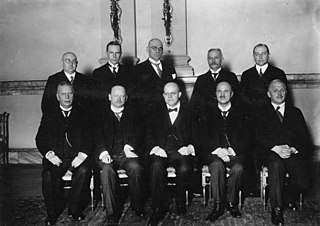
The fourth Marx cabinet, headed by Wilhelm Marx of the Centre Party, was the 15th democratically elected government during the Weimar Republic. On 29 January 1927 it replaced the third Marx cabinet, which had resigned after information concerning clandestine operations by Germany's armed forces, the Reichswehr, had come to light.

State elections were held in the Free State of Prussia on 26 January 1919. The elections were held a week after the elections to the federal National Assembly, and were the first elections of Prussian institutions held using proportional representation and with women's suffrage. The election was also the first truly free and fair Prussian election, as it was the first election held after the abolition of the Prussian three-class franchise, which grouped voters by the amount of taxes paid and gave disproportionate weight to the wealthy.